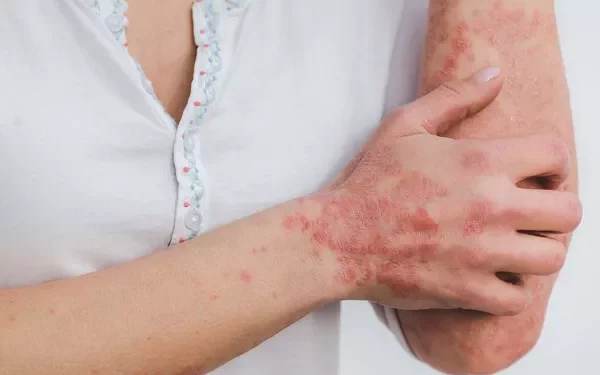Psoriasis is a chronic skin condition characterized by the rapid growth of skin cells that lead to thick, scaly patches. It affects millions of people worldwide and has various triggers, including stress, infections, and certain medications. One factor that can exacerbate psoriasis for some individuals is exposure to the sun. This article delves into the reasons why the sun can worsen psoriasis, exploring the mechanisms behind this phenomenon and providing insights into managing sun exposure effectively.
Understanding Psoriasis and Its Triggers
Psoriasis is an autoimmune condition where the body’s immune system mistakenly attacks healthy skin cells, causing rapid skin cell turnover. The result is the formation of plaques—thick, red patches covered with silvery scales. While the exact cause of psoriasis is not fully understood, it is believed to involve a combination of genetic and environmental factors.
Common triggers for psoriasis flare-ups include:
- Stress: Emotional or physical stress can trigger or exacerbate psoriasis.
- Infections: Infections, particularly streptococcal throat infections, can trigger guttate psoriasis, a specific type of the condition.
- Medications: Certain medications, such as lithium, antimalarials, and beta-blockers, can worsen psoriasis.
- Climate: Cold, dry weather can dry out the skin, leading to flare-ups.
- Skin injuries: Cuts, scrapes, and sunburns can trigger the Koebner phenomenon, where psoriasis develops at the site of skin trauma.
The Dual Nature of Sun Exposure
Sun exposure has a complex relationship with psoriasis. For some individuals, moderate exposure to sunlight can help improve symptoms. Ultraviolet (UV) radiation from the sun can slow down the rapid skin cell turnover associated with psoriasis, leading to a reduction in plaques and inflammation. This is the basis for phototherapy, a common treatment for psoriasis that involves controlled exposure to UV light.
However, for others, the sun can worsen their psoriasis symptoms. This paradoxical effect can be attributed to several factors, including the type and duration of sun exposure, individual skin sensitivity, and the presence of specific triggers.
How the Sun Can Worsen Psoriasis
Sunburn and the Koebner Phenomenon
One of the most significant ways the sun can exacerbate psoriasis is through sunburn. Sunburn is a form of skin damage caused by excessive exposure to UV radiation. For individuals with psoriasis, sunburn can trigger the Koebner phenomenon, where new psoriasis lesions develop at the site of skin injury.
When the skin is sunburned, it becomes inflamed and damaged, leading to an immune response. In individuals with psoriasis, this immune response can trigger the formation of new plaques in areas where the skin was previously unaffected. The severity of the Koebner response can vary from person to person, but it often leads to a significant worsening of psoriasis symptoms.
Photosensitivity
Some individuals with psoriasis may have increased photosensitivity, meaning their skin is more sensitive to UV radiation. This can result in a heightened inflammatory response to sun exposure, leading to more severe flare-ups. Photosensitivity can be caused by certain medications, such as those used to treat psoriasis (e.g., methotrexate and certain biologics), or other underlying conditions.
Photosensitivity can cause symptoms such as redness, itching, and blistering, which can aggravate existing psoriasis plaques or lead to the development of new ones. It is essential for individuals with psoriasis to be aware of their skin’s sensitivity to the sun and take appropriate precautions.
Heat and Sweating
Sun exposure often goes hand-in-hand with increased temperatures and sweating. Heat and sweating can irritate the skin and exacerbate psoriasis symptoms. Sweating can cause itching and discomfort, leading individuals to scratch their skin, which can trigger the Koebner phenomenon.
Moreover, heat can cause the skin to become dry and dehydrated, further aggravating psoriasis. Keeping the skin moisturized and cool is crucial for managing psoriasis, especially during hot weather or prolonged sun exposure.
SEE ALSO: Does Psoriatic Arthritis Affect the Eyes?
Immune System Activation
UV radiation from the sun can have complex effects on the immune system. While moderate exposure to UV light can have anti-inflammatory effects, excessive exposure can lead to an overactive immune response. This overactivity can trigger or worsen autoimmune conditions, including psoriasis.
For some individuals, prolonged sun exposure can lead to a rebound effect, where the immune system becomes hyperactive after the initial suppression caused by UV light. This rebound effect can result in more severe psoriasis flare-ups once the sun exposure is reduced.
Managing Sun Exposure with Psoriasis
Given the potential for sun exposure to worsen psoriasis, it is essential for individuals with this condition to take proactive steps to protect their skin. Here are some strategies for managing sun exposure effectively:
Use Sunscreen
Applying a broad-spectrum sunscreen with a high SPF is crucial for protecting the skin from harmful UV radiation. Choose a sunscreen that is free of fragrances and other potential irritants to avoid exacerbating psoriasis symptoms. Apply sunscreen generously and reapply every two hours, or more frequently if swimming or sweating.
Seek Shade
Limit direct sun exposure, especially during peak hours when UV radiation is strongest (usually between 10 a.m. and 4 p.m.). Seek shade under umbrellas, trees, or other structures to reduce the risk of sunburn and skin damage.
Wear Protective Clothing
Covering the skin with protective clothing can help minimize sun exposure. Wear lightweight, long-sleeved shirts, long pants, and wide-brimmed hats to shield the skin from UV rays. Some clothing is designed with built-in UV protection for added safety.
Monitor Medications
If you are taking medications for psoriasis or other conditions, check with your healthcare provider about their potential to increase photosensitivity. Your provider can advise you on how to manage sun exposure while taking these medications.
Moisturize Regularly
Keeping the skin well-moisturized is essential for managing psoriasis. Use gentle, fragrance-free moisturizers to prevent dryness and irritation. Moisturizing after sun exposure can help soothe the skin and prevent flare-ups.
Stay Hydrated
Drink plenty of water to keep your skin and body hydrated, especially during hot weather. Proper hydration can help maintain skin health and reduce the risk of psoriasis flare-ups.
Gradual Exposure
If you find that moderate sun exposure improves your psoriasis, gradually increase your time in the sun to avoid sudden overexposure. Start with short periods and gradually extend your time outdoors, always using sun protection measures.
Consulting a Dermatologist
Managing psoriasis can be challenging, and the impact of sun exposure on the condition can vary significantly from person to person. Consulting a dermatologist is crucial for developing a personalized plan to manage psoriasis effectively. A dermatologist can provide guidance on:
Identifying Triggers: Understanding your specific triggers, including how sun exposure affects your psoriasis, is essential for effective management.
Tailoring Treatment: Your dermatologist can recommend treatments that consider your skin’s sensitivity to the sun and other factors.
Phototherapy: If UV light therapy is recommended, a dermatologist can provide controlled treatments to minimize the risk of adverse effects.
Conclusion
The relationship between sun exposure and psoriasis is complex and can vary widely among individuals. While moderate sun exposure can benefit some people with psoriasis, excessive exposure and sunburn can worsen the condition due to factors such as the Koebner phenomenon, photosensitivity, heat, sweating, and immune system activation.
Taking proactive steps to protect your skin from harmful UV radiation, seeking shade, using sunscreen, wearing protective clothing, and consulting a dermatologist can help manage psoriasis effectively. Understanding your triggers and developing a personalized plan can lead to better management of psoriasis and improved quality of life.
Related Topics:

























